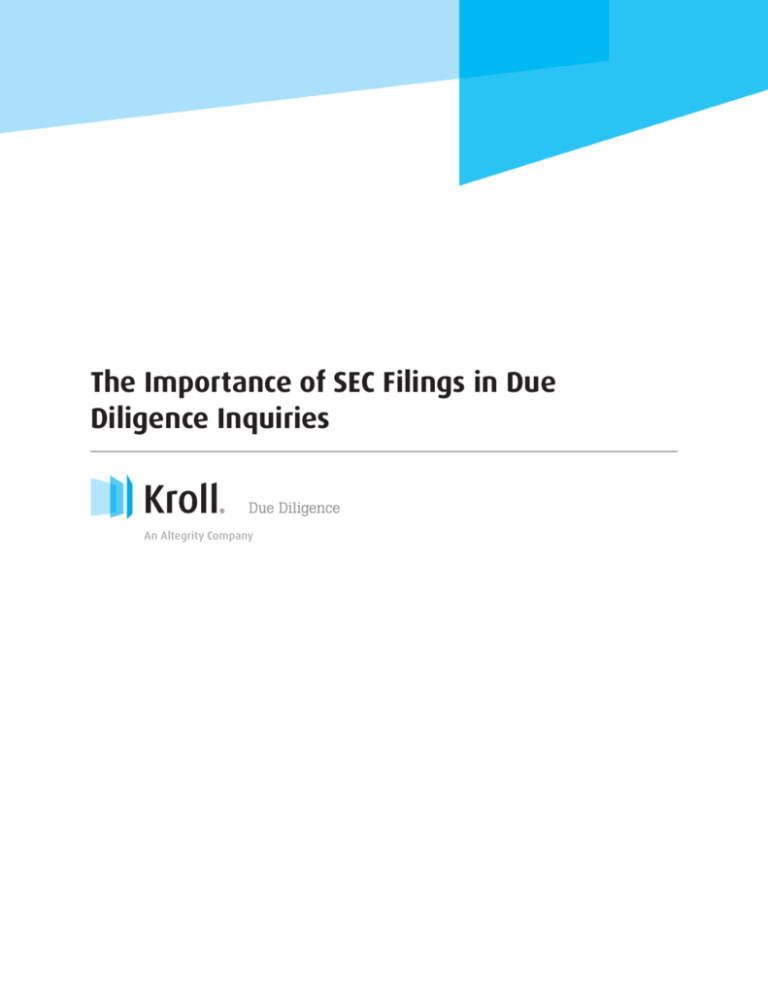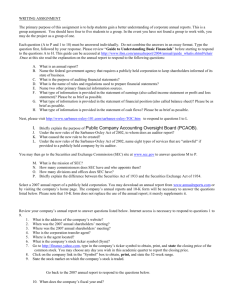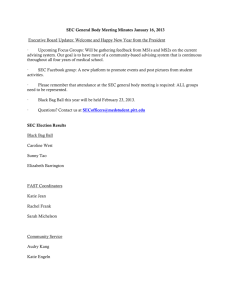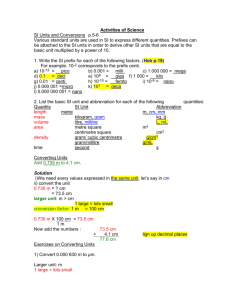
The Importance of SEC Filings in Due
Diligence Inquiries
Due Diligence
An Altegrity Company
The Importance of SEC Filings in Due Diligence Inquiries
The U.S. Securities and Exchange Commission (SEC) was established in 1934 during a period in American history
that was marked by the Great Depression. The SEC evolved out of the Securities Act of 1933 and the Securities
Exchange Act of 1934 and was designed to restore investor confidence in the capital markets by providing
investors and the markets with more reliable information and a clear set of rules for honest dealing.
The SEC requires public companies to disclose meaningful financial and other information to the public, which
enables investors to refer to a common pool of knowledge on a specific company in order to make sound and
informed business decisions. By collecting this information from public companies, the SEC is able to accomplish
its primary mission, which is to promote the disclosure of important market-related information, while maintaining
fair dealing and protecting against fraud.
In conducting due diligence inquiries, recognition and analysis of SEC filings is vital to the development of a
complete profile of a company. While some high-profile investigations and litigation are captured in the media
and elicit public attention, other less widespread or noteworthy probes, which are required by law to be disclosed
in SEC filings, may be just as important to those seeking an accurate picture of a company and its business
operations.
The practice of backdating stock options was widespread in Silicon Valley during the explosion of dot-com
companies in the late 1990s, which eventually led to billions of dollars in financial restatements that occurred
over the past several years. A company that was the focus of the government’s investigation into the practice
of backdating stock options was San Jose, California-based Brocade Communications Systems, Inc. A class action
settlement with plaintiffs who sued the company over its backdating practices resulted in a US$160 million
payment. This was on top of the US$7 million settlement that Brocade reached in May 2008 with the SEC without
admitting or denying guilt into stock option backdating at the company. A review of Brocade’s SEC filings would
document the financial restatements that were necessary to correct inaccurate filings that were made as a result
of the backdating practices. A review of these filings would provide a detailed explanation of the actual revenues
and expenses for the company.
While the SEC plays a critical oversight role, there is no guarantee that all the filings a company submits
to the Commission are accurate. In 2001 and 2002, WorldCom was at the center of a lawsuit the SEC filed
alleging widespread fraud. The company was forced to restate its financial reports for 2001 and the first
quarter of 2002 after accounting irregularities were discovered totaling nearly US$4 billion. In its SEC filings, the
company reportedly booked expenses improperly as investments in order to hide losses. This type of material
overstatement in income not only can signal a red flag for a company’s financial statements, but it could also raise
concerns about its overall business activities and its corporate culture.
The fact that a company has submitted a filing to the SEC does not guarantee its accuracy; however, since the
SEC mandated that top corporate management sign off on all financial statements as of August 15, 2002, it does
decrease the likelihood of fraudulent filings considering the potential risk of legal action against executives for
signing off on inaccurate statements. In the case of Cabletron Systems and its spinoff, Enterasys Networks, a
conspiracy occurred between 2000 and 2002 to fraudulently inflate revenue at the companies for more than 10
quarters. Several executives were indicted on securities fraud charges and four were found guilty and received
prison sentences ranging from three to 12 years. Through a careful review of a company’s SEC filings not only
before, but also after, such a scandal is uncovered can provide valuable information. What happened after any
-1-
necessary financial restatements were made? Did earnings and revenue go up or down? What happened to
the company’s stock price? Are the salaries and bonuses of executives and board members on par with other
companies in the industry? Has the company laid off any of its workforce?
The information that is disclosed in SEC filings includes, but is not limited to shares of ownership of common stock
by company executives and board members, yearly salary and bonus awards to executives and board members,
internal or external investigations into the company’s business practices, quarterly and annual financial reports,
pending lawsuits that involve the company, related party transactions, and financial restatements. A thorough
review of the information that is filed with the SEC allows for potential red flags to be identified and properly
evaluated in order to determine the risks they may pose to future business transactions.
There are numerous different types of filings that companies make with the SEC. Some of these filings provide
insight into a company’s financial status, changes in executive leadership, or intentions to pursue a merger with
another company. Below are some of the most common SEC filings, which provide crucial information as to the
business dealings and transactions that are occurring at a company:
»» Form 10-K, 10-K/A – Annual report on a company. This filing includes information on the company’s
business and services, acquisitions and investments, legal proceedings, executives’ and board members’
compensation, and related party transactions, along with other comprehensive information about the
dealings of the company during the past year. These filings can also contain useful biographical information
on officers and directors.
»» Form 10-Q, 10-Q/A – Quarterly report on a company. This filing includes information on the company’s
financial status during the preceding three months.
»» Form 8-K, 8-K/A – Current report filing. This filing includes information on recently announced news
pertaining to a company and its business activities. This may include information such as amendments that
are made to a company’s articles of incorporation or bylaws.
»» Form S-1, S-1/A – Registration statement. This filing will include information on the commencement date of
proposed sales of securities to the public.
»» Form DEF 14A, DEFM14A – Definitive proxy statements. This filing includes information on any mergers or
acquisitions involving a company. It also provides information on annual stockholders meetings.
»» Form 4 – Statement of changes in beneficial ownership of securities. This filing includes information on
changes that are made to the shares of common stock that are held by a company executive or board
member (purchases or sales of shares of common stock).
Reviewing SEC filings can also prove to be valuable when looking at non-public companies. A wide range of
information on private companies is often disclosed in public filings. For example, lawsuits in which private
companies are named as a party to litigation involving a public entity will appear in SEC filings. Information
on corporate executives and board members will also appear in these public filings, which often reveal that
executives may serve on the boards of one or more public or private companies.
A review of public filings with the SEC provides a complete picture of the business activities of a company, which is
crucial to the completion of a full risk assessment. As highlighted above in the cases of Brocade Communications,
-2-
WorldCom, and Cabletron Systems, there is pertinent information filed with the SEC (and when necessary,
investigated by the SEC), which provides valuable insight into the potential risks and liabilities associated with
a particular company. Whether evaluated on its own or combined with a full suite of due diligence checks, a
thorough review of applicable SEC filings can provide one with valuable information that is necessary in making an
informed and sound business decision.
For more information, call, email or visit us online.
877.230.9082
edd-contactus@kroll.com
www.kroll.com
Certain Altegrity companies provide investigative services. State licensing information can be found at www.altegrity.com/compliance.
Copyright © 2011 Kroll. All rights reserved.
The Importance of SEC Filings in Due Diligence WP 23 040811PR









